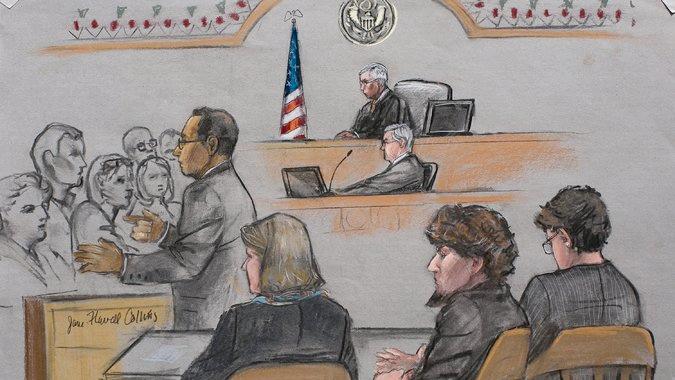Aloke Chakravarty, a prosecutor, addressed jurors during closing arguments in the Boston Marathon bombings trial of Dzhokhar Tsarnaev.
The courtroom was stone-cold quiet as defendant Dzhokhar Tsarnaev entered.
The jury had reached a verdict on each of the 30 charges he faced for the April 13 bombing at the finish line of the 2013 Boston Marathon.
Tsarnaev was found guilty of all charges against him. That obviously includes the 17 charges that carry the death penalty.
Three died at the scene of the Boylston Street bombing within minutes — Martin Richard (age 8), Lu Lingzi (A BU student from China) and Krystal Campbell (a local restaurant manager).
Another 264 people were taken to local hospitals, eight with wounds so severe that they required limbs to be amputated. An MIT police officer, Sean Collier, was killed in a subsequent, related incident. And Richard Donahue, an MBTA worker, was shot seriously — possibly by friendly fire that raged in the attempt to capture Dzhokhar and his late brother, Tamerlan.
Writer Juliette Kayyem called the verdict "not surprising but still jarring."
"Part of that is just the closure and the sense that this is finally done and for those of us who live in Boston, or raising kids in Boston or Cambridge — how strong the emotions of that week still are," she says. "I do think there is something about the presentation of the evidence that we’d never seen before … the families being able to hear and experience the case against him [that will lead to a sense of closure]."
There was a great deal of controversy that led up to even having this trial. Kayyem points out that influential and prominent politicians like Sen. John McCain and Sen Kelly Ayotte in New Hampshire, and others, wanted Tsarnaev tried by a military tribunal, and not in a traditional US court.
"Thank God we didn’t," she adds. "If there is any argument for a military tribunal it’s because the evidence was collected in war and the chain of custody might be hard to show in a normal criminal court. Our criminal justice system — and this has been a debate even before Sept. 11 — was not built for terrorism, but it can change and morph and still retain the basic attributes of the rights to hear the evidence against you."
Journalist Masha Gessen, who covered the trial at the federal courthouse in Boston, says the juror selection process was also controversial, offering a clash between Massachusetts culture and federal law.
Capital punishment hasn't been legal in Massachusetts since 1982 and hasn't been used in a state case since 1947. "The vast majority of residents are opposed to the death penalty," Gessen says. "On the other hand, it's a federal case, it's a death penalty case.''
What that meant: Any juror who was opposed to the death penalty is automatically disqualified.
The upshot, Gessen says, is that that the court had to choose jurors "from a minority of the state's population, and probably a minority with a fairly distinct political profile."
The sentencing phase of the trial will begin Monday. Jurors will be asked to consider whether Tsarnaev should be put to death for any of the 17 charges that carry potential death penalty sentences, as well as other sentences for the other 13 convictions.
The Charges Against Dzhokhar Tsarnaev:
Count 2: Death penalty count. Use of a weapon of mass destruction, Pressure Cooker Bomb #1, resulting in death; and aiding and abetting. Guilty.
Count 8: Death penalty count. Possession and use of a firearm, Pressure Cooker Bomb #1, during and in relation to a crime of violence, resulting in death; aiding and abetting. Guilty.
Count 11: Conspiracy to maliciously destroy property, resulting in death. Guilty.
Count 25: Use of a weapon of mass destruction, Pipe Bomb #1, on or about April 19, 2013, in the vicinity of Laurel Street and Dexter Avenue in Watertown; aiding and abetting. Guilty.
Count 26: Possession and use of a firearm, a Ruger P95 9mm semiautomatic handgun and Pipe Bomb #1, during and in relation to a crime of violence; aiding and abetting. Guilty.
Count 27: Use of a weapon of mass destruction, Pipe Bomb #2 on or about April 19, 2013, in the vicinity of Laurel Street and Dexter Avenue in Watertown; aiding and abetting. Guilty.
Count 28: Possession and use of a firearm, a Ruger P95 9mm semiautomatic handgun and Pipe Bomb #2, during and in relation to a crime of violence; aiding and abetting. Guilty.
Count 29: Use of a weapon of mass destruction, Pipe Bomb #3 on or about April 19, 2013, in the vicinity of Laurel Street and Dexter Avenue in Watertown; aiding and abetting. Guilty.
Count 30: Possession and use of a firearm, a Ruger P95 9mm semiautomatic handgun and Pipe Bomb #3, during and in relation to a crime of violence; aiding and abetting. Guilty.
Every day, reporters and producers at The World are hard at work bringing you human-centered news from across the globe. But we can’t do it without you. We need your support to ensure we can continue this work for another year.
Make a gift today, and you’ll help us unlock a matching gift of $67,000!
